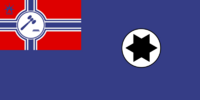Bavogia: Difference between revisions
mNo edit summary |
mNo edit summary |
||
| Line 1: | Line 1: | ||
'''Bavogia''', commonly referred to as the '''Northeastern province''', is the smallest but most populated province of [[ | '''Bavogia''', commonly referred to as the '''Northeastern province''', is the smallest but most populated province of [[Calderan Republic|Caldera]]. Bavogia is often referred to as the [[Indigeno-Calderan|Volin]] province, as a reference to the majority of Volins living in it. Bavogia is the only province not to have any members of the [[Volkspartei]] in power, and the current [[List of Plaza Heads of Bavogia|plaza head]] of Bavogia is not a member of any party, but is ethnically Volin. Bavogia is mostly a residential area, with its only exports being weaved baskets and clothes. | ||
{{Infobox settlement | {{Infobox settlement | ||
| Line 6: | Line 6: | ||
| population_demonym = Bavogian | | population_demonym = Bavogian | ||
| subdivision_type = Country | | subdivision_type = Country | ||
| subdivision_name = {{Flagicon image| | | subdivision_name = {{Flagicon image|DrapeauLeMieux.webp|size=25px}} [[Calderan Republic|Caldera]] | ||
| native_name = ᎬᏃᏥ | | native_name = ᎬᏃᏥ | ||
| native_name_lang = Volin | | native_name_lang = Volin | ||
| Line 91: | Line 91: | ||
=== Sports === | === Sports === | ||
Whereas | Whereas Caldera's main sports are hockey and association football, Bavogia's official sport is Kravget, a native Volin sport. | ||
=== Symbols === | === Symbols === | ||
In order to establish a national identity separate from | In order to establish a national identity separate from Caldera, Bavogia maintains a variety of national symbols, such as Mashk, the palm tree, the salmon, and the pheasant. The six pointed star is a common symbol of Bavogia, being featured in both the Bavogian flag and Northeastern provincial flag. The origins of the 6 pointed star are somewhat unknown, but it could relate to the 8 pointed star featured in the Calderan flag which represents the sun. Some historians point out that early depictions of Mashk feature a snake named Kashir companion which had similar 6 pointed fins around its neck. | ||
== Economy and Infrastructure == | == Economy and Infrastructure == | ||
| Line 117: | Line 117: | ||
== Military == | == Military == | ||
Being part of | Being part of Caldera, Bavogia's formal military is the [[Calderan Armed Forces]], but a provincial guard also exists to serve as a defense against a terrestrial invasion. The Bavogian Provincial Guard may also be called the Northeastern Province Guard in the same style of the Southeastern Province Guard and Western Province Guard. | ||
[[Category:Austro-Caldera]] | [[Category:Austro-Caldera]] | ||
[[Category:IXWB]] | [[Category:IXWB]] | ||
[[Category:Crona]] | [[Category:Crona]] | ||
Revision as of 17:48, 1 May 2024
Bavogia, commonly referred to as the Northeastern province, is the smallest but most populated province of Caldera. Bavogia is often referred to as the Volin province, as a reference to the majority of Volins living in it. Bavogia is the only province not to have any members of the Volkspartei in power, and the current plaza head of Bavogia is not a member of any party, but is ethnically Volin. Bavogia is mostly a residential area, with its only exports being weaved baskets and clothes.
Bavogia
ᎬᏃᏥ Northeastern province | |
|---|---|
Province | |
| Nickname(s): Paradise Province | |
| Motto(s): "We trust in the gods" | |
| Anthem: Those who fail to perish | |
 | |
| Country | |
| First settled by Indigeno-Calderans | First Century |
| Province Established | July 1, 1658 |
| Founded by | Arnold Kurzlow |
| Capital | Movingwater |
| Government | |
| • Type | Democratically elected Republic |
| • Body | Bavogian Plaza |
| • Plaza Head | Good Bird |
| Population (2030) | |
| • Total | 6,540,000 |
| • Rank | 1st |
| • Density rank | 2nd |
| Demonym(s) | Bavogian |
| Official Language | Volin |
Etymology
The origin of the term Bavogia is disputed, but its first recorded use was in Movingwater, Bavogia, when the legislature of the Northeastern province became established as the Bavogian Plaza. Bavogian to show that anybody in the province can be in power, and plaza to show that the government is public for all.
Dual Flags

There have been two flags commonly used to represent Bavogia. Alongside the official provincial flag which sports a field of blue with a purple hoist with a gold border between the two and 3 gold Bavogian stars, a pro-Volkspartei flag has also been used to represent Bavogia, based on the flag of the Southeastern Province.
The pro-Volkspartei flag is notably used in Little Caldera, where it is flown in place of the official flag alongside the flags of the Western and Southeastern provinces. Despite this, the official flag of Bavogia is still used in Little Caldera parades.
History
Bavogia was founded by Volkspartei leader Arnold Kurzlow in 1658 as a way to administer Calderan lands easier, and divide the Gothic population from the natives. Originally, he intended for the territory to only be called the Northeastern province in order to prevent independence movements from mounting, but over time many Volin rights leaders came to name the territory as Bavogia in order to separate themselves from the Gothic nation and promote freedom within their own borders.
Government and Politics
Bavogia has a unicameral legislature called the Bavogian Plaza, and they also have an elected plaza head that oversees the Bavogian Plaza as well as finalizes or vetoes any laws passed by the plaza. The plaza head may also remove or appoint any representatives if at least 3 representatives agree with the decision.
Unlike on a national level, Bavogia has no limits on what parties can be in power and typically has had a Volin majority government. Unofficially, Volins were always allowed to vote for representatives since the 1700s, however, this was not legal federally until 2003, after the Siege of Little Caldera.
Currently, the plaza head of Bavogia is Good Bird, and no political parties hold any majority seats.
Demographics
Ethnicity
The vast majority of Bavogians are Volin, and the only recognized minority group is Gothic. Bavogia is the only Calderan province where Gothic people are a recognized minority as opposed to the majority.
Language
The only language used in government is Volin. Bavogia is the only province where Gothic isn't used in government.
Religion
Most Bavogians are Volinist, but a considerable minority are Christian.
Education
Bavogia offers free primary education, which 95% of Bavogians take and pass. However, less than 5% of Bavogians ever take secondary education.
Culture
Education
Aside from Calderan national requirements, Bavogia offers more in depth Volin history courses in primary school. Secondary education is not encouraged in the province, and the majority of jobs do not require it. This is in contrast to the two other provinces where machining jobs and political jobs all require secondary education.
Attitudes and worldview
Like most Calderans, Bavogia tends to be nationalistic, but particularly towards the Volin ethnicity and history. The province tries to undermine federal laws whenever it can, and where this sometimes makes Volkspartei members want to retort, most agree that Bavogia would be best if it was left as de jure under Calderan control, but de facto semi-autonomous. Bavogia typically imports product from other countries much more often than any other province.
Kinship and family
Although Bavogians rarely get married, they will usually stick to one partner at a time, and will especially stay by partner's sides if they have children. Bavogian law mandates that children must be DNA tested at birth to make sure the father is the real father, and that the child's ethnic descent is correctly documented. This encourages Bavogian families to stick together, despite the historic Volin tradition of splitting apart when the child turns 8 years old.
Cuisine
The official dish of Bavogia is fish over a bed of rice, especially served in a basket weaved from native plants. Bavogian dishes are characterized by being Volin in origin, and featuring a form of rice with an additive, like in lemon rice or watermelon scoop. A popular Bavogian dessert is Nishkay, a form of cheesecake with rice in it.
Arts and Literature
Despite native Volin art being mostly wooden statues, Bavogian art is much broader and features a variety of combinations between Burgoignesc and Volin themes. Books published in Bavogia are typically written in Volin and feature a form of international conflict, as an ode to the unique Bavogian appeal on the international stage.
Sports
Whereas Caldera's main sports are hockey and association football, Bavogia's official sport is Kravget, a native Volin sport.
Symbols
In order to establish a national identity separate from Caldera, Bavogia maintains a variety of national symbols, such as Mashk, the palm tree, the salmon, and the pheasant. The six pointed star is a common symbol of Bavogia, being featured in both the Bavogian flag and Northeastern provincial flag. The origins of the 6 pointed star are somewhat unknown, but it could relate to the 8 pointed star featured in the Calderan flag which represents the sun. Some historians point out that early depictions of Mashk feature a snake named Kashir companion which had similar 6 pointed fins around its neck.
Economy and Infrastructure
Industries and Sectors
Bavogia is relatively undeveloped in terms of industries, and as such, its biggest industries are fishing and sewing.
Currency
Like all Calderan provinces, the currency of Bavogia is the Calderan Piece.
Healthcare
Unlike in the southeast province, all healthcare is free in Bavogia and paid through commercial taxes on sold items.
Labor
Due to being a sub-national entity, legally all labor laws enforced by the Calderan Bureau of Criminal Apprehension, however, due to a lack of industry, many jobs are not seen by the BCA, and Bavogian employers sometimes violate national laws while knowing they won't be enforced unless they are directly reported to the BCA.
Transportation
Public transportation is uncommon in Bavogia, and automobiles are incredibly popular.
Technology
Bavogia is not very technologically advanced, and as such, often imports technology from other countries.
Military
Being part of Caldera, Bavogia's formal military is the Calderan Armed Forces, but a provincial guard also exists to serve as a defense against a terrestrial invasion. The Bavogian Provincial Guard may also be called the Northeastern Province Guard in the same style of the Southeastern Province Guard and Western Province Guard.
